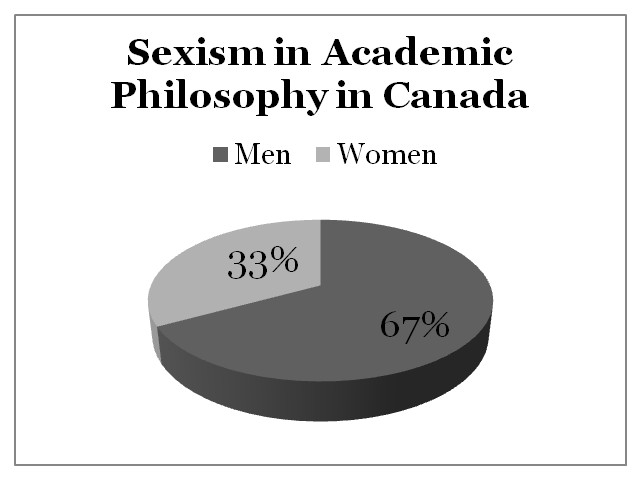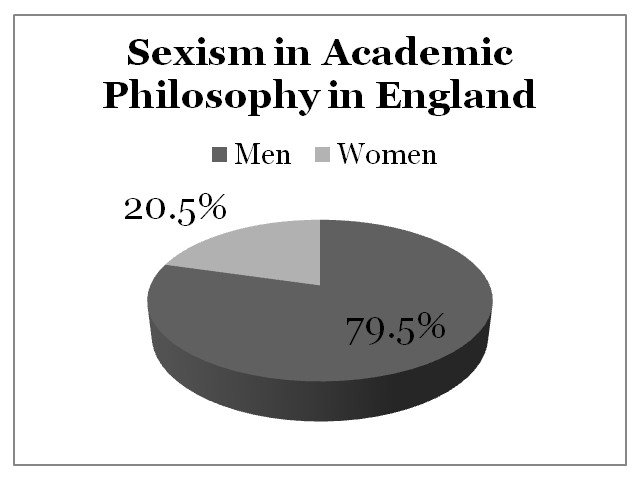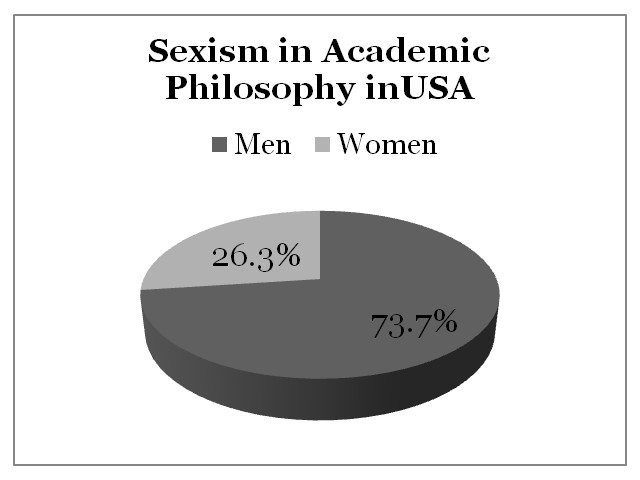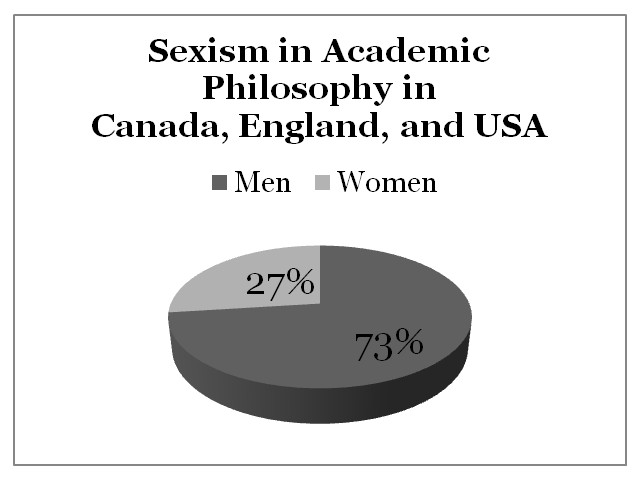Sexism in Academic Philosophy
in Canada, England, and USA
Racism in Academic Philosophy in Canada, England, and the USA
By: Shawn Alli
Posted: May 9, 2016

*All individuals and organizations receive 7 full days of pre-publication notice (11 including weekends).
*I ask for a request for comment from the philosophy department instead of the university spokesperson because it's the philosophy department (philosophers) that are racist or sexist.
*I round up to one decimal place for all figures.
*All statistics are created from philosophy department websites.
It's tough to say what's worse, racism or sexism. On the one hand it's apples and oranges. On the other hand, discrimination is discrimination. Though the container is unique, it's all the same at the core. It's similar to the feeling of pain. While everyone's pain is colored by their unique circumstances, pain is pain.
But sexism is such an odd ball in the 21st century. Despite women attaining the highest human office possible (Margaret Thatcher, Dilma Rousseff, and Angela Merkel), women are still looked down upon. And religion is the ultimate excuse for men. My god is masculine and rules everything. Women can pretend to have authority on the Earth as presidents/prime ministers, but men rule in the heavens.
While many liberal intellectuals see sexism as a religious problem, in reality it's an ideological problem. Packaging sexism in the religion or science container doesn't change the fact that it's an ideological problem.
And yes, the misogynistic behavior towards women is a problem in the 21st century. But the core problem is ideology. Sexist behavior is merely a symptom of sexist ideologies. I attempt to create a solution in Philosophy Reborn Part II: Social Humanities.
While sexism is well known in religious and scientific circles, the problem exists just as much in academia, specifically, in academic philosophy. But don't take my word for it. Listen to female philosophers in Richard Marshall's 2014 book Philosophy at 3:AM: Questions and Answers with 25 Top Philosophers.
Philosopher Hilde Lindemann:
According to the National Center for Education Statistics, only 20 percent of all postsecondary teachers of philosophy are women, and only 16 percent are in tenure-track jobs. A common explanation is that women just aren't very interested in the topics philosophy concerns itself with, but I don't buy it - you can do philosophy on anything. The real problem is that women aren't welcome.
...Women graduate students were ridiculed in seminars, by professors as well as men students, for asking questions that don't have the right kind of edge to them, and if they develop the edge they get treated as men-wannabees. When they go on the job market they get interviews because most universities require good-faith efforts be made to recruit women, but somehow, mysteriously, the best qualified people in the candidate pool turn out to be men. [1]
Philosopher and Neuroscientist Patricia S. Churchland:
So when at meeting philosophers would yell at me "You are not really a philosopher at all, snarl, snarl," I was having a pretty hearty chuckle inside. Or as Tina Fey would say, I did not care. I knew it did not matter. I think the field of philosophy has changed over the last 40 years, and it is much better for women now than it was in 1969, when I got my first job. Nevertheless, throughout my career there were men who, hating me or my work or both, put obstacles in my way when it suited them. [2]
Philosopher Elizabeth S. Anderson:
It is stunning how far behind philosophy is, not just compared to the other humanities but to most other disciplines - including economics, chemistry, statistics, biochemistry, and molecular biology - in the representation of women. Even mathematics and astrophysics have more women. No theory of biological sex differences can credibly explain this. [3]
The easiest and worst form of sexism isn't the behavior towards women. It's the intentional withholding of financial and economic security. In academic philosophy that means withholding tenure from female philosophers.
I set the bar at 1/3 (33.3%). I'm saying that if an academic philosophy department doesn't have at least 1/3 of its tenured faculty as women, they're sexist. More accurately put, I'm saying that the philosophers in the department (who make up the hiring committee) are sexist. And yes, even women can be sexist against other women.
But why 1/3 and not 1/2 or 1/4? Unfortunately, I only have a subjective answer. If there are zero tenured women in a department of ten philosophers, it should be obvious that the philosophers are sexist. But what if there's one woman (10%)? That's more about filling a quota (affirmative action) to make it appear that the philosophy department isn't sexist. Two people (20%) still feels like affirmative action instead of respecting women as tenure-track professors. But three people (30%) or 1/3 is my standard. Anything below that counts as sexism for a university department in my book.
The 1/3 count is relative to universities because they're quite old (decades to centuries). University executives have enough time to be gender neutral in their tenure-track faculty. But I don't recommend using the same bar on small businesses or new corporations. That's judging too harshly. You need to give them time to thrive and expand.
I only include separate philosophy departments. I don't include philosophy departments in combination with humanities, english, literature, psychology, public affairs, social inquiry, languages, history, classics, economics, political science, social sciences, communications, and religion.
Though I'm against the tenure system, it still exists, so I have to use it as the highest standard of success. I only count full tenure-track professors as professors. This includes associate, assistant, curator's professor, commonwealth professor, distinguished, distinguished visiting, endowed professorship/chair, research assistant, or emeritus recalled.
I don't include emeritus, affiliated faculty, cross-appointed faculty, adjunct, graduate students, part time lecturers, lecturers A or B, readers, senior lecturers, sessional lecturers, permanent lectureship, instructors, full-time adjunct, post-doctoral fellow, visiting assistant, visiting scholars, courtesy professor, continuing lecturer, regular visiting, recurring visiting faculty, limited term assistant, long term visiting, or replacement.
The UK doesn't have a tenure system so I only include full professors.
I'm not able to include all philosophy departments because some don't have pictures of their faculty members. I can't say a department is sexist if I can't see them. And more often than not, men and women have gender neutral names. I don't include the following philosophy departments because of a lack of profile pictures:
Canada:
Brock University (10)
Université de Montréal (22)
Université du Québec (16)
Université Laval (17)
University of Manitoba (12)
University of Ottawa (20)
USA:
East Carolina University (18)
Fordham University (29)
Loyola University Chicago (29)
Metropolitan State University of Denver (13)
Texas State University (12)
University of Massachusetts, Boston (12)
University of Wisconsin-Platteville (12)
West Chester University (13)
Wichita State University (10)
I only include philosophy departments that have 10 or more tenure-track/full professors.
All figures are for the 2015-2016 academic year.
Unfortunately, the margin of error is impossible to estimate. In the book I include 130 universities and 2186 professors. I push that down to 129 and 2176 in the online article due to pre-publication corrections. I take out an entire department because "teaching professors" aren't tenure-track professors. Yet some are teaching for over 9 years in the department. 9 years without tenure? Seriously?
Most philosophy departments don't comment so I'm not sure if my tenure-track numbers are accurate. While all pie charts may be inaccurate they at least show the overall picture. And the overall picture is racism and sexism in philosophy departments in regards to tenured faculty.
And if you include all philosophy departments regardless of size or cross-listed departments, I believe that the numbers will be worse.
Canada
Total Number of Universities: 18
Total Number of Professors: 334

England
Total Number of Universities: 7
Total Number of Professors: 122

USA
Total Number of Universities: 104
Total Number of Professors: 1720

All Three Countries
Total Number of Universities: 129
Total Number of Professors: 2176

Only 20/129 philosophy departments have more than 40% women in tenure-track positions. But the tenure numbers may be inaccurate due to a lack of responses from the philosophy departments.
The ideology that sexism or racism is so complex is complete nonsense. Sexism is an ideology. More accurately put, intellectuals (the knowledge givers) have sexist and/or racist ideologies. And this is reflected in the tenure-track process.
You need to realize that male academic philosophers are the problem, not the solution. It's like a corrupt politician being in charge of ethics. The surface changes are for the sake of appearances. Most male academic philosophers believe that the core of academic philosophy is a masculine vocation. They'll give women a few openings here and there, but the core will always be masculine until you finally call them out as sexist.
If you want to find out how a particular university stacks up, you only need to scroll down to see sexism in the 21st century.
*Note: Out of 129 universities, only 11 universities are kind enough to provide a response to my email request for comment (7 days pre-publication notice, 11 including weekends).
Canada:
Saint Mary's University - Responds to an email request for comment.
University of British Columbia
England:
University of Birmingham - Responds to an email request for comment.
University of Nottingham - Responds to an email request for comment.
USA:
Indiana University Bloomington
Massachusetts Institute of Technology
Ohio State University, Columbus
Princeton University - Responds to an email request for comment.
Rutgers University, New Brunswick - Responds to an email request for comment.
San Francisco State University
Southern Connecticut State University
Southern Illinois University, Carbondale
Southern Illinois University, Edwardsville
Texas Tech University - Responds to an email request for comment.
University of California, Berkeley
University of California, Davis
University of California, Los Angeles
University of California, Riverside
University of California, San Diego
University of Colorado, Boulder
University of Connecticut - Responds to an email request for comment.
University of Delaware - Responds to an email request for comment.
University of Illinois at Chicago
University of Illinois at Urbana-Champaign
University of Maryland, College Park
University of Massachusetts, Amherst
University of Michigan, Ann Arbor
University of Minnesota, Twin Cities
University of Missouri, Columbia
University of Nebraska-Lincoln
University of North Carolina, Chapel Hill
University of Oregon - Responds to an email request for comment.
University of Pennsylvania - Responds to an email request for comment.
University of Southern California
University of Tennessee, Knoxville - Responds to an email request for comment.
University of Wisconsin, Madison
University of Wisconsin, Milwaukee
Washington University, St. Louis
And if you'd like to see racism in academic philosophy take a look at the article: Racism in Academic Philosophy in Canada, England, and the USA.
References:
[1] Marshall, Richard. Philosophy at 3:AM: Questions and Answers with 25 Top Philosophers. Oxford University Press. 2014. p. 182.
[2] Ibid. p. 110.
[3] Ibid p. 189.






